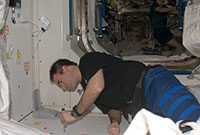Feb 9 2009
Even in space, someone has to clean the bathroom. Good housekeeping is essential when you're living in the close quarters of a tightly-sealed spaceship for months at a time.
To make this possible, NASA scientists have developed a tricorder-like device called "LOCAD-PTS" that can track down microscopic bacteria and fungi. It helps astronauts do their chores.

"The crew of the space station works hard to keep things clean," says Norm Wainwright, principal investigator for LOCAD-PTS (Lab-On-A-Chip Application Development Portable Test System) at the Marshall Space Flight Center. "Our instrument tells them where to focus their efforts."
Strange, but true: LOCAD works using enzymes from the immune system of a horseshoe crab. Astronauts swab a surface with a high-tech Q-tip, insert a sample into the LOCAD device, and crab-chemistry does the rest. In less than 15 minutes, the LOCAD test system tells the crew if they've got some cleaning to do.
During March to May 2007, astronaut Sunita "Suni" Williams proved LOCAD's adeptness at detecting gram negative bacteria in the space station's Node 1 and US Lab.
In June and September 2008, a station crew tested a second type of LOCAD cartridge, designed to detect fungi. First, they tested Node 1 and found it virtually fungi-free. That sounds like great news, but it didn't help the LOCAD scientists prove the abilities of the new cartridge.
So just a couple of weeks ago, astronaut Sandy Magnus decided to play hard ball. She thought of a place that would surely be a fungi factory – the spot where crewmembers put their feet to brace themselves while working on their laptops.
Wrong. Clean.
A determined fungi-finder, Magnus tried another location. She went to the "gym," where station astronauts ride a modified exercise bike and a treadmill to combat the muscle weakening effects of microgravity. To keep themselves from floating up off the bicycle seat while pedaling, the sweaty space cyclers hold onto hand brackets.
You guessed it -- fungi are thoroughly enamored with an oft-sweaty surface. LOCAD ratted out some hand bracket fungi.
"The fungi posed no immediate health concern to the crew," says Maule, LOCAD-PTS project scientist. "But Magnus called to Houston to say, 'Tomorrow I'm going to give those brackets a good cleaning.' That's just what we want -- the intuitive reaction 'I need to clean that.'"
In years to come, spacecraft cleanliness will be a critical issue for another reason: "One of the key scientific goals for NASA's future Constellation missions beyond low Earth orbit will be to prepare to search for life on Mars," says Maule.
All humans carry stowaway microbes around with them on their skin, microbes that shouldn't be allowed to contaminate Mars samples. On the other hand, they don't want to bring unwanted alien life forms back into the spacecraft.
"The crew will need a way to monitor themselves before and after EVA [extra-vehicular activity]," says Maule. "LOCAD is ideal for that purpose. We've used it successfully during EVA tests on the ground."
The LOCAD team has also conducted several tests in the US Quest airlock, the conduit from the interior cabin to the outside of the space station where the crew "camps out" overnight and depressurizes before venturing outside. LOCAD proved the airlock to be pretty clean in general, but showed that the handle to the airlock entrance harbored gram negative bacteria. Bacteria on a surface like the airlock handle would be a concern if crew members were about to embark on a sample collecting excursion on Mars.
It would seem that finding fungi onboard the ISS is just the beginning for LOCAD. There are chores to be done ... and the whole solar system awaits.